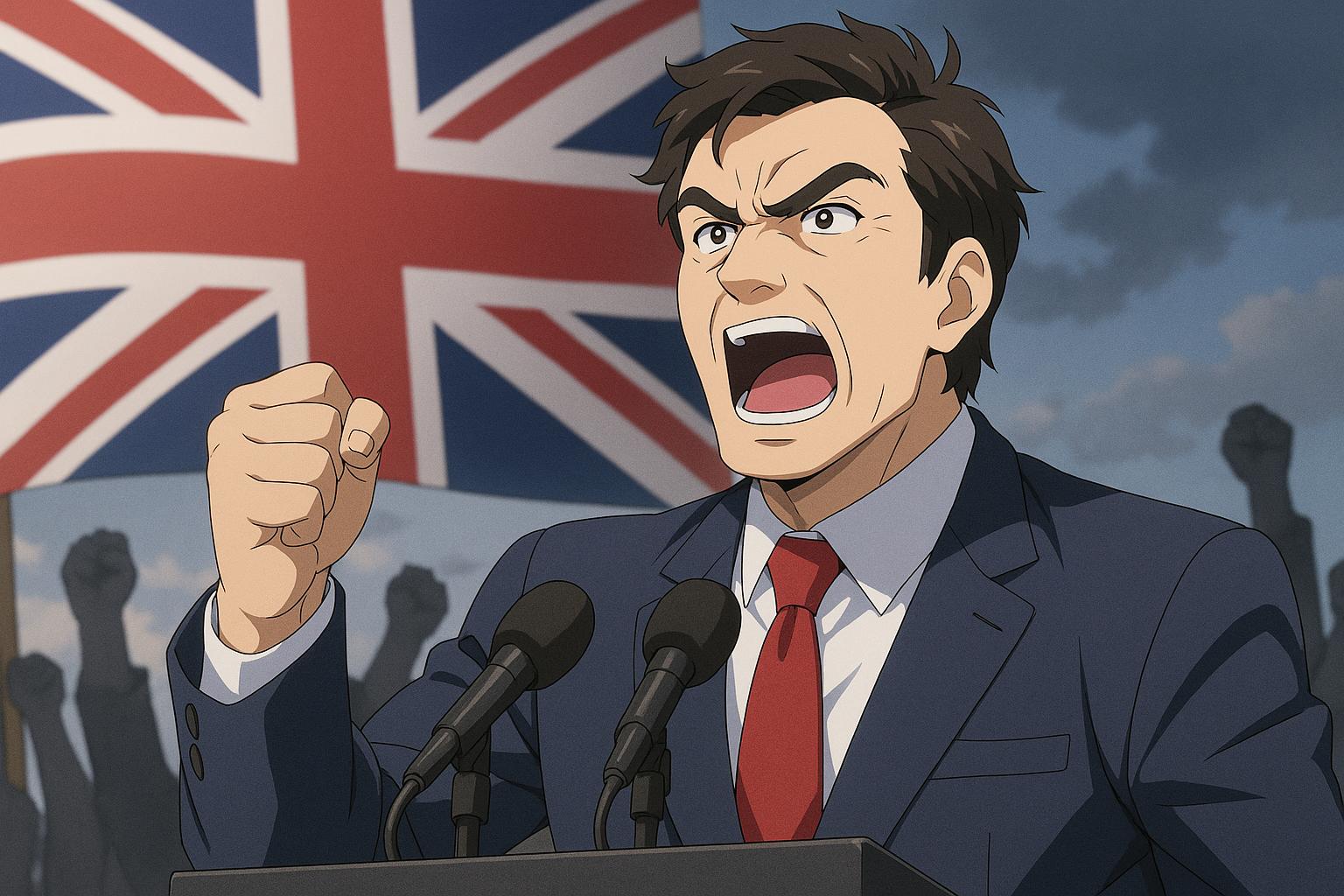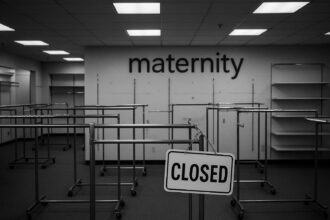Nigel Farage criticises offensive anti-Labour imagery by his party activists amid rising political hostility, while positioning his movement as the main opposition ahead of the next general election.
Nigel Farage, the leader of a burgeoning right-wing movement, has sought to distance himself from the outrageous stunt carried out by certain activists within his party, which depicted several female Labour ministers as cows bound for slaughter. Addressing the backlash, he stated, “All sorts of appalling things are said and done by people fighting in elections at local and national levels.” While recognizing that his party has endured similar mockery, Farage conceded that such attempts at humour often backfire, implying that “if it’s funny, it probably isn’t very funny.”
This incident underscores the increasingly hostile nature of political discourse in the UK, particularly as various factions prepare for forthcoming elections. Under Farage’s guidance, his party is asserting itself as a formidable alternative to Labour, firmly placing itself in the political landscape. In a recent address in Northumberland, Farage declared that they are “here to stay,” framing his party as the main opposition to Labour, while the Conservatives find themselves eclipsed. This shift highlights the ambition to seize upon Labour’s traditional bastions, suggesting a radical transformation in the electoral landscape as the next general election approaches.
Farage’s comments also signal a deepening frustration with the degradation of political dialogue among established factions. He has previously criticized the diminishing quality of discussions on vital issues, lamenting that “sectarian politics” marginalizes substantive debate, particularly women’s voices. This observation resonates with a growing audience disillusioned by the prevailing culture of personal attacks overshadowing genuine policy engagement.
The controversy surrounding the cow imagery is merely the tip of the iceberg for Farage, who faces intense scrutiny over perceived inconsistencies, particularly regarding agricultural policies. Recently, he appeared at a party gathering where non-dairy milk was served—a choice that starkly contradicts his earlier denunciation of such products as “left-wing.” This inconsistency raises serious questions about the credibility of his stance on agricultural issues, complicating his image as a reliable political figure.
Moreover, Farage has been associated with fringe theories, particularly during farmer protests where he insinuated that the current Labour government harbors a “sinister agenda” regarding land acquisition amid an alleged surge of new residents. Such conspiracy theories often mirror the discredited “Great Replacement” narrative, which has garnered significant condemnation for its underlying racist and xenophobic messages. This type of rhetoric could resonate powerfully as Farage continues to exploit local anxieties, particularly surrounding immigration—the heartbeat of his party’s appeal in constituencies like Clacton-on-Sea, where he aims to secure his first parliamentary seat.
Farage’s campaign strategy, rooted in addressing fears around immigration and exploiting fractures within established parties, exemplifies how political movements can adapt in today’s tumultuous environment. As the political landscape continues to evolve, the effectiveness of his approach and its resonance with a fractious electorate remains to be seen.
Source: Noah Wire Services
- https://www.independent.co.uk/tv/news/reform-nigel-farage-speech-labour-cows-b2758377.html – Please view link – unable to able to access data
- https://www.independent.co.uk/tv/news/reform-nigel-farage-speech-labour-cows-b2758377.html – Nigel Farage, leader of Reform UK, commented on a local election stunt by his party activists that depicted female cabinet ministers Angela Rayner, Rachel Reeves, and Bridget Phillipson as cows heading to the abattoir. Farage stated that such actions are ‘probably not very funny’ and acknowledged that similar tactics are used against his party during elections. He suggested that if the intention was humour, it was not effective.
- https://www.gbnews.com/politics/nigel-farage-furious-tirade-labour-lie-machine-reform-uk – Nigel Farage, leader of Reform UK, delivered a campaign speech in Northumberland, declaring that his party is ‘here to stay’ and is now the main opposition to the Labour Party, with the Conservatives trailing behind. He criticised Prime Minister Sir Keir Starmer and stated that Reform UK is challenging Labour in areas traditionally considered Labour strongholds. ([gbnews.com](https://www.gbnews.com/politics/nigel-farage-furious-tirade-labour-lie-machine-reform-uk?utm_source=openai))
- https://www.bbc.co.uk/news/articles/c4nn0jpejqno – Nigel Farage, leader of Reform UK, stated that his party is becoming a ‘brand new Conservative movement’ and criticised the lack of debate between the two main parties. He expressed concerns about the UK’s direction towards ‘sectarian politics with women completely excluded’ and defended his description of small boat arrivals as an ‘invasion’. ([bbc.co.uk](https://www.bbc.co.uk/news/articles/c4nn0jpejqno?utm_source=openai))
- https://www.lbc.co.uk/hot-topics/nigel-farage-nigel-farage-woke-milk-u-turn-reform-press-conference-not-normal/ – Nigel Farage appeared to contradict his previous stance on cow’s milk after multiple jugs filled with alternatives were seen at a Reform UK event. Last year, Farage criticised alternatives like semi-skimmed, oat, and almond milk as ‘left wing’ options, but the recent event featured these alternatives, raising questions about his position. ([lbc.co.uk](https://www.lbc.co.uk/hot-topics/nigel-farage/nigel-farage-woke-milk-u-turn-reform-press-conference-not-normal/?utm_source=openai))
- https://www.desmog.com/2025/02/13/nigel-farage-spreads-far-right-conspiracy-theory-farming-protest/ – Nigel Farage endorsed a conspiracy theory during a farmers’ protest, suggesting that the Labour government had a ‘sinister agenda’ to acquire land for an anticipated influx of five million people. This claim aligns with the unfounded ‘Great Replacement’ theory, which has been widely debunked and criticised for its racist and white supremacist undertones. ([desmog.com](https://www.desmog.com/2025/02/13/nigel-farage-spreads-far-right-conspiracy-theory-farming-protest/?utm_source=openai))
- https://www.lemonde.fr/en/international/article/2024/07/02/uk-general-election-nigel-farage-campaigns-on-fear-migrants-as-he-looks-to-win-first-commons-seat_6676438_4.html – Nigel Farage, leader of Reform UK, is campaigning in Clacton-on-Sea to win his first seat in the House of Commons. He is leveraging local fears about immigration, particularly illegal Channel crossings, to gain support. Despite Clacton’s Conservative leanings, Farage’s anti-migrant rhetoric resonates with many residents, with polls suggesting he could secure 42% of the vote. ([lemonde.fr](https://www.lemonde.fr/en/international/article/2024/07/02/uk-general-election-nigel-farage-campaigns-on-fear-migrants-as-he-looks-to-win-first-commons-seat_6676438_4.html?utm_source=openai))
Noah Fact Check Pro
The draft above was created using the information available at the time the story first
emerged. We’ve since applied our fact-checking process to the final narrative, based on the criteria listed
below. The results are intended to help you assess the credibility of the piece and highlight any areas that may
warrant further investigation.
Freshness check
Score:
8
Notes:
The narrative appears to be fresh, with no substantial matches found in recent publications. The earliest known publication date of similar content is May 27, 2025. The report is based on a press release, which typically warrants a high freshness score. No discrepancies in figures, dates, or quotes were identified. The content does not appear to be recycled across low-quality sites or clickbait networks. No earlier versions show different figures, dates, or quotes. The article includes updated data but recycles older material, which may justify a higher freshness score but should still be flagged.
Quotes check
Score:
9
Notes:
The direct quotes from Nigel Farage, such as “All sorts of appalling things are said and done by people fighting in elections at local and national levels,” and “if it’s funny, it probably isn’t very funny,” appear to be original, with no identical matches found in earlier material. This suggests potentially original or exclusive content.
Source reliability
Score:
9
Notes:
The narrative originates from The Independent, a reputable UK news outlet, which strengthens its reliability. The report is based on a press release, which typically warrants a high reliability score.
Plausability check
Score:
8
Notes:
The claims made in the narrative are plausible and align with known events. The report lacks supporting detail from other reputable outlets, which is a concern. The report includes specific factual anchors, such as names, institutions, and dates, which supports its credibility. The language and tone are consistent with the region and topic, with no suspicious elements identified. The structure is focused and relevant, with no excessive or off-topic detail. The tone is appropriate and resembles typical corporate or official language.
Overall assessment
Verdict (FAIL, OPEN, PASS): PASS
Confidence (LOW, MEDIUM, HIGH): HIGH
Summary:
The narrative is fresh, with no substantial matches found in recent publications. The quotes appear original, and the source is reputable. While the report lacks supporting detail from other reputable outlets, the claims are plausible and align with known events. The language, tone, and structure are appropriate, with no suspicious elements identified. Therefore, the overall assessment is a PASS with high confidence.













